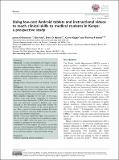| dc.contributor.author | O’Donovan, James | en_US |
| dc.contributor.author | Ahn, Roy | en_US |
| dc.contributor.author | Nelson, Brett D | en_US |
| dc.contributor.author | Kagan, Calvin | en_US |
| dc.contributor.author | Burke, Thomas F | en_US |
| dc.date.accessioned | 2016-10-11T20:28:51Z | |
| dc.date.issued | 2016 | en_US |
| dc.identifier.citation | O’Donovan, James, Roy Ahn, Brett D Nelson, Calvin Kagan, and Thomas F Burke. 2016. “Using low-cost Android tablets and instructional videos to teach clinical skills to medical students in Kenya: a prospective study.” JRSM Open 7 (8): 2054270416645044. doi:10.1177/2054270416645044. http://dx.doi.org/10.1177/2054270416645044. | en |
| dc.identifier.issn | 2054-2704 | en |
| dc.identifier.uri | http://nrs.harvard.edu/urn-3:HUL.InstRepos:29002707 | |
| dc.description.abstract | Objectives: To assess the feasibility and impact of using a low-cost Android tablet to deliver clinical skills training to third-year medical students in Kenya. Design: A prospective study using a low cost tablet called ‘connecTAB’, which was designed and manufactured specifically for areas with low bandwidth. Instructional video tutorials demonstrating techniques of cardiovascular and abdominal clinical examinations were pre-loaded onto the tablet. Setting: Maseno University School of Medicine, Western Kenya. Participants: Fifty-one third-year medical students from Maseno University School of Medicine were subjects in the study. Twenty-five students were assigned to the intervention group and 26 to the control group. Main outcome measures At the start of the study, students from both groups completed an Observed Structured Clinical Examination (OSCE) of the cardiovascular and abdominal evaluations. Students who were allocated to the intervention group then received the connecTAB, whereas students in the control group did not. After a period of three weeks, students from both groups completed a post-study OSCE for both the cardiovascular and abdominal evaluations. Results: There were significantly higher improvements in the scores for both cardiovascular and abdominal examinations (p < 0.001) within the group who received the e-tablets as compared to the control group. Conclusion: The study suggests that access to connecTAB improves clinical education and efficacy and holds promise for international training in both medical and allied healthcare professional spheres in resource-limited settings. | en |
| dc.language.iso | en_US | en |
| dc.publisher | SAGE Publications | en |
| dc.relation.isversionof | doi:10.1177/2054270416645044 | en |
| dc.relation.hasversion | http://www.ncbi.nlm.nih.gov/pmc/articles/PMC4973399/pdf/ | en |
| dash.license | LAA | en_US |
| dc.subject | mHealth | en |
| dc.subject | e-learning | en |
| dc.subject | clinical examination | en |
| dc.title | Using low-cost Android tablets and instructional videos to teach clinical skills to medical students in Kenya: a prospective study | en |
| dc.type | Journal Article | en_US |
| dc.description.version | Version of Record | en |
| dc.relation.journal | JRSM Open | en |
| dash.depositing.author | Nelson, Brett D | en_US |
| dc.date.available | 2016-10-11T20:28:51Z | |
| dc.identifier.doi | 10.1177/2054270416645044 | * |
| dash.contributor.affiliated | Nelson, Brett | |
| dash.contributor.affiliated | Burke, Thomas | |


